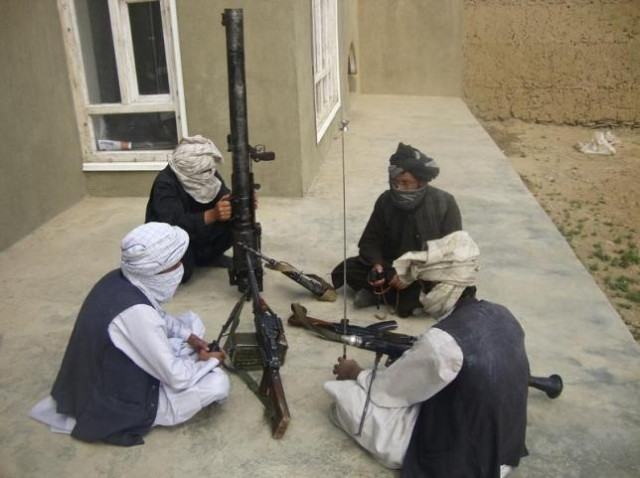Taliban sceptical of peace talks as March approaches
Spokesperson says group not aware of developments regarding quadrilateral alliance

PHOTO: REUTERS
Dr Naeem Wardag, the Taliban spokesperson in Qatar, claims the militant group is “unaware” of the quadrilateral group’s discussions.
Wardag’s remarks coincide with a statement by Pakistan Foreign Office Spokesperson Mohammad Nafees Zakaria who says Islamabad is approaching all factions of the Taliban and other groups for direct peace talks with the Afghan government.
 Naeem, who is also a former student of the International Islamic University, Islamabad, reiterates the Taliban’s stance. He says the leadership has empowered the Taliban office to deal with all political affairs, but it has not been informed about discussions in the four-nation process yet.
Naeem, who is also a former student of the International Islamic University, Islamabad, reiterates the Taliban’s stance. He says the leadership has empowered the Taliban office to deal with all political affairs, but it has not been informed about discussions in the four-nation process yet.“How will it be possible to join a process we are not even aware of?” he said in an exclusive interview with The Express Tribune over the phone from Doha. “They (Afghanistan, Pakistan, China and the US) have held four rounds of talks,” he said. “But we really do not know the real story and for what purpose the meetings were held. We have categorically clarified that every step should be towards implementing Sharia and ending the invasion in Afghanistan.”
The Taliban spokesperson added, “These are long-standing demands and we have shared them with the international community. We have asked them to cooperate with us and the Afghan nation to end the invasion. We want this and anyone can help us.”
However, there is a strong likelihood that Hizb-e-Islami Afghanistan, the second largest resistance movement, led by former Prime Minister Gulbuddin Hekmatyar, could take part in the talks as a majority of its central council are in favour of accepting the dialogue offer.
Hizb-e-Islami’s leaders have been reportedly involved in consultations on Thursday and recommended joining the talks, a source familiar with the matter told The Express Tribune.
A final decision will be taken by Hekmatyar. No date has been fixed for the talks. However, sources in Kabul have suggested they can be between March 2 and March 6.
All eyes are now on the Taliban’s decision which will determine the fate of the long-awaited and urgently required negotiations as Afghans are concerned over the Taliban’s spring offensive. The Taliban launch this assault in late March or early April and there are serious apprehensions that fighting in 2016 can be intense as Taliban control more areas.
The militants have expanded their war from the traditional influential Pukhtun-majority areas in southern and eastern parts to northern parts of the war-torn country.
For their part, Afghan security forces are changing their war strategy to defend vulnerable posts. Troops have been pulled out of Musa Qala and Nawzad districts in southern Helmand province as the Taliban mounted pressure.
The group is now controlling 11 of the 13 districts in the province. US-led Nato allies are helping Afghan forces defend Lashkar Gah, the capital of Helmand, as losing it will come as a huge embarrassment.
A top Afghan commander in Helmand, General Esmatullah Daulatzai, said US troops have returned to the southern part of the province and their arrival will improve security. America has reportedly announced the deployment of hundreds of troops in Helmand.
Tolo TV quoted Daulatzai as saying some troops have already arrived and the US has planned to send 800 additional ones. Until now, the notion has been that Chief Executive Dr Abdullah Abdullah’s camp was opposed to peace negotiations. However, recent statements by two of President Ashraf Ghani’s close aides apparently upset the Taliban political negotiators, an insider said.
Ghani’s National Security Adviser Hanif Atmar told the militant group that it has “limited time” to join negotiations and the “doors will not be open forever”.
Afghanistan First Vice President General Rashid Dostam, addressing his militia in northern Jawzjan province, reiterated he will not allow the Taliban to establish an “Islamic Emirate”. Such statements by top government leaders at a sensitive time are not considered helpful to the already difficult process.
One of the main aspects of the four-nation roadmap for peace and reconciliation is that the national unity government in Kabul will create a conducive atmosphere ahead of talks, a participant of the quadrilateral meetings told The Express Tribune.
As Afghanistan floated the roadmap itself, the responsibility to avoid such remarks rests on its shoulders.
Published in The Express Tribune, February 27th, 2016.













COMMENTS
Comments are moderated and generally will be posted if they are on-topic and not abusive.
For more information, please see our Comments FAQ